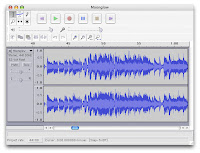In my old neighborhood of Maida Vale, London W9 lived the BBC Radiophonic Workshop. Using the power of magnetic tape, electronic oscillators, tone generators, live music and foley sound, artists and engineers alike David Shea, Mark Ayers, Daphne Oram, Delia Derbyshire, Desmond Briscoe, Eddie Kramer, Ron Grainer made pioneering scores for radio and TV. And occassionally I would see a few of them at my local Warrington Hotel Pub now owned by the brutish chef from Hells Kitchen Gordon Ramsey. By 1995 most of the works of the Radiophonic Workshop had ended at Maida Vale Studios.
Often, these sound gurus played with recorded natural sounds (tin cans dropping, water drops, trash can lids, etc.) and live music to create sounds the evoked emotion and atmospheric consequences in radio plays and TV. The group in Maida Vale were respected among the pioneering industrial music composers of the time. They are best known, perhaps, for the theme music and scores to the cult British TV-classic Dr. Who.
While their techniques could seem dated today and other film artists have mocked the sound, many of their groundbreaking methods were the foundation of digital mixing and mashups we can now easily do on our desktop and laptop computers. With digital recording, we can do in seconds what took hours to create using analog tape in the early 1960s.
Minneapolis filmmaker Rick Dublin's masterful 1998 eleven minute film BUBBLEPAC uses environmental and manufactured sound to create a film score that is as important to storytelling as the script, actors or their dialog. By capturing atmospheric sound and enhancing the viewer involvement of being in the space and world of the story, you can transform locations into a sensory experience that will distinguish your film from all the rest.
Thursday, July 24, 2008
Sunday, July 6, 2008
Post-Production Audio: Samples, Music, Mash-ups and More
 While most filmmakers strive to capture location sound cleanly and separately with a design concept for their finished soundscape, there are times when you might have to search out audio to suppliment the wild track recordings you obtain in the field. Thanks to the internet and what is known as Creative Commons, the tools and resources for filmmakers has become immensely rich.
While most filmmakers strive to capture location sound cleanly and separately with a design concept for their finished soundscape, there are times when you might have to search out audio to suppliment the wild track recordings you obtain in the field. Thanks to the internet and what is known as Creative Commons, the tools and resources for filmmakers has become immensely rich.Freesound Project has created a huge collaborative database of audio snippets, samples, recordings, and natural sounds found in nature and human-created environments. All of Freesound Project audio files are released under the Creative Commons Sampling Plus License.
Freesound Project allows you to search, sample and download (and upload) audio files to your computer and use them in accordance with Creative Commons rules. The huge database can be a tremendous resource for you in the post-production sound mix, helping you create a more realistic setting for the soundscape of your short film.
ccMixter is another excellent source of Creative Commons audio files to download, sample, cut-up, mash-up, and share but it differs from Freesound in that its primary focus is music and remixes.
And while many of you have applications you prefer to use on your computer, Audio Editors are available for download for FREE on the internet. Remember, the learning curve for mastering audio and video editing software can be long and might slow your progress in getting to the finishing line on August 15th.
Subscribe to:
Comments (Atom)



